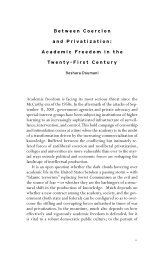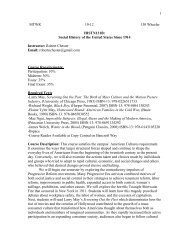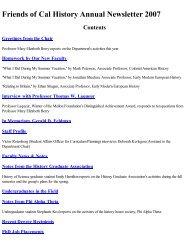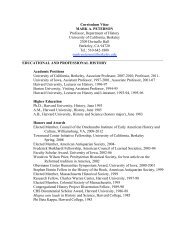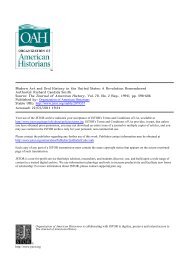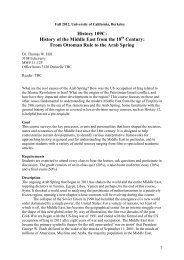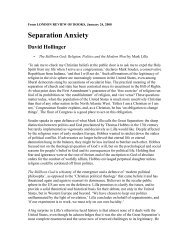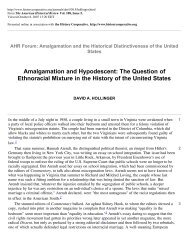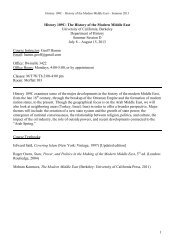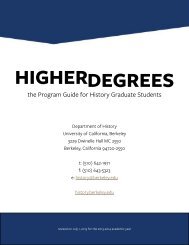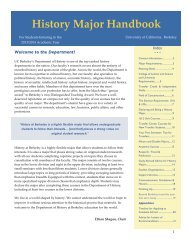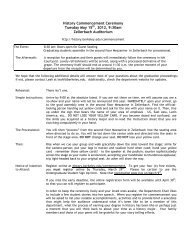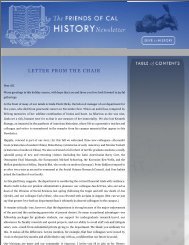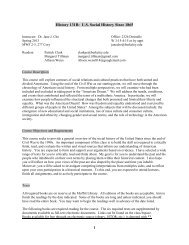My Grandmother and Other Stories: Histories of the Palestinians as ...
My Grandmother and Other Stories: Histories of the Palestinians as ...
My Grandmother and Other Stories: Histories of the Palestinians as ...
You also want an ePaper? Increase the reach of your titles
YUMPU automatically turns print PDFs into web optimized ePapers that Google loves.
In his diary, Turjman expressed hostility to both N<strong>as</strong>h<strong>as</strong>hibi <strong>and</strong> Jaber for <strong>the</strong>ir<br />
arrogance <strong>and</strong> elitism. But he w<strong>as</strong> particularly venomous towards Adel Jaber, whom<br />
he accused <strong>of</strong> being an apologist for Jamal P<strong>as</strong>ha <strong>and</strong> at one point, a secret agent for<br />
<strong>the</strong> government. 57 He narrates how on 15 May, 1915, Jaber w<strong>as</strong> sent to Jaffa on behalf<br />
<strong>of</strong> P<strong>as</strong>ha, most likely on a mission related to recruitment for <strong>the</strong> Salahiyyah College.<br />
At <strong>the</strong> end <strong>of</strong> <strong>the</strong> entry, he approvingly quotes his cousin H<strong>as</strong>an al-Khalidi, indicating<br />
that Adel Jaber is “an Ottoman spy”. 58 Jaber himself never disguised his pro-CUP<br />
sentiments, <strong>and</strong> defended Ottoman policy in heated debates with N<strong>as</strong>h<strong>as</strong>hibi, Sakakini,<br />
<strong>and</strong> Musa Alami, <strong>and</strong> continued to do so until <strong>the</strong> end <strong>of</strong> <strong>the</strong> war. In his political<br />
leanings, he w<strong>as</strong> not alone.<br />
This episode reflects <strong>the</strong> tension building in that period between Arab secessionists<br />
<strong>and</strong> Ottomanists within <strong>the</strong> Palestinian (<strong>and</strong> Syrian-Lebanese) intelligentsia. There is<br />
no indication whatsoever that Ihsan’s spying accusation against Jaber had any b<strong>as</strong>is in<br />
fact (it is possible, on <strong>the</strong> o<strong>the</strong>r h<strong>and</strong>, that Adel w<strong>as</strong> secretly vying for <strong>the</strong> attention <strong>of</strong><br />
Suraya, Ihsan’s woman friend). It w<strong>as</strong> this schism in <strong>the</strong> ranks <strong>of</strong> Arab political groups<br />
that Jamal w<strong>as</strong> seeking to foster between what he considered ‘extreme nationalists’,<br />
<strong>and</strong> moderate Arab nationalist. 59 He saw al-Salahiyyah <strong>as</strong> <strong>the</strong> institutional b<strong>as</strong>e from<br />
which he could build a cadre <strong>of</strong> a loyalist Arab civil service for <strong>the</strong> new regime. 60<br />
Ano<strong>the</strong>r major objective for <strong>the</strong> Salahiyyah w<strong>as</strong> to create an intellectual b<strong>as</strong>e for a<br />
pan-Islamic movement under Ottoman sponsorship. According to Martin Strohmeier,<br />
Jamal P<strong>as</strong>ha aimed at training “<strong>the</strong>ologians who would be both open-minded <strong>and</strong><br />
intellectually equipped to deal with secular <strong>and</strong> scientific concepts” in <strong>the</strong> spirit <strong>of</strong><br />
Muhammad Abdo. 61 The latter w<strong>as</strong> greatly admired by Sakakini’s circle–<strong>the</strong> group<br />
that later became known <strong>as</strong> <strong>the</strong> party <strong>of</strong> ‘Vagabonds’, but <strong>the</strong>y moved beyond Abdo’s<br />
objectives <strong>of</strong> Islamic reform, adopting essentially secular (<strong>and</strong> sometimes antireligious)<br />
perspectives. With British troops approaching sou<strong>the</strong>rn Palestine, Jamal<br />
P<strong>as</strong>ha moved <strong>the</strong> premises <strong>of</strong> <strong>the</strong> college, toge<strong>the</strong>r with <strong>the</strong> students <strong>and</strong> teaching staff,<br />
to Dam<strong>as</strong>cus. Subsequently, <strong>the</strong> Salahiyyah college failed, being unable to recruit<br />
students from outside <strong>the</strong> Syrian-Palestinian are<strong>as</strong> (that is, from India <strong>and</strong> Indonesia)<br />
<strong>as</strong> Jamal had anticipated, <strong>and</strong> too short-lived to develop an independent school <strong>of</strong><br />
thought. Sakakini <strong>and</strong> Rustum Haidar soon defected <strong>and</strong> joined <strong>the</strong> Arab rebellion.<br />
Ihsan’s own readings while serving under Roshen Bey were very eclectic. The family<br />
had a substantial library at home from which Is’af al-N<strong>as</strong>h<strong>as</strong>hibi <strong>and</strong> Musa Alami<br />
used to borrow books. He also added several volumes during his apprenticeship at<br />
<strong>the</strong> Dusturiyyah college. In <strong>the</strong> long hours at his desk, he used to read al-Zamachshari<br />
<strong>and</strong> o<strong>the</strong>r Arab cl<strong>as</strong>sics, such <strong>as</strong> <strong>the</strong> History <strong>of</strong> Arab Civilization by Muhammad Kurd<br />
Ali, who w<strong>as</strong> a chief supporter <strong>of</strong> al-Salahiyyah’s pan-Islamic program. Ihsan read<br />
<strong>and</strong> admired Q<strong>as</strong>im Amin’s book Tahrir al-Mar’a (The Liberation <strong>of</strong> Women, Cairo,<br />
1899). But he also w<strong>as</strong> a heavy consumer <strong>of</strong> romantic novels–what would be called<br />
Jerusalem Quarterly 30 [ 45 ]



